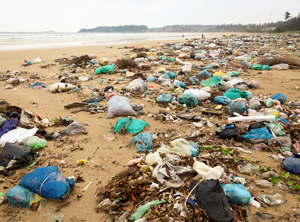PLASTICS WASTE
New UK standard for atmospheric biodegradability of polyolefins
 The BSI said its new standard identifies the requirements that allow plastics to biodegrade in the open (Photo: PantherMedia/dnaumoid) |
Plastics manufacturers will be able to work out the biodegradability of polyolefins in the open air under a new standard from the British Standards Institute (BSI, London; www.bsigroup.com).
With plastics waste piling up, manufacturers and brand owners are looking for ways to either produce materials that can be easily recycled or can disintegrate in the open air. Some producers have made claims about the biodegradability of materials treated with air-reactive additives.
The BSI said its new standard, “PAS 9017 Plastics – Biodegradation of polyolefins in an open-air terrestrial environment – Specification”, identifies the requirements for polyolefinic materials treated with additives that allow them to biodegrade in the open. The standard, which does not cover plastics in marine environments, also specifies the chemical analysis and the numerical limits required for compliance at the end of each stage of testing, according to the institute.
The BSI said polyolefin-based materials make up about half of plastics litter, and three quarters of all plastics waste ends up on land. Only polyolefin products that show a 90% deterioration within two years can be said to have met standard’s testing procedures, the BSI said, but it warned against companies making claims about biodegradability based on the requirements.
Scott Steedman, standards director at the BSI, said, “Tackling the global challenge of plastic waste requires imagination and innovation. New ideas need agreed, publicly available, independent standards to enable the delivery of trusted solutions by industry.” Steedman said PAS 9017 is the first stakeholder consensus on how to measure the biodegradability of polyolefins, something that “will accelerate the verification of technologies for plastic biodegradation.”
With plastics waste piling up, manufacturers and brand owners are looking for ways to either produce materials that can be easily recycled or can disintegrate in the open air. Some producers have made claims about the biodegradability of materials treated with air-reactive additives.
The BSI said its new standard, “PAS 9017 Plastics – Biodegradation of polyolefins in an open-air terrestrial environment – Specification”, identifies the requirements for polyolefinic materials treated with additives that allow them to biodegrade in the open. The standard, which does not cover plastics in marine environments, also specifies the chemical analysis and the numerical limits required for compliance at the end of each stage of testing, according to the institute.
The BSI said polyolefin-based materials make up about half of plastics litter, and three quarters of all plastics waste ends up on land. Only polyolefin products that show a 90% deterioration within two years can be said to have met standard’s testing procedures, the BSI said, but it warned against companies making claims about biodegradability based on the requirements.
Scott Steedman, standards director at the BSI, said, “Tackling the global challenge of plastic waste requires imagination and innovation. New ideas need agreed, publicly available, independent standards to enable the delivery of trusted solutions by industry.” Steedman said PAS 9017 is the first stakeholder consensus on how to measure the biodegradability of polyolefins, something that “will accelerate the verification of technologies for plastic biodegradation.”
20.10.2020 Plasteurope.com [246090-0]
Published on 20.10.2020
